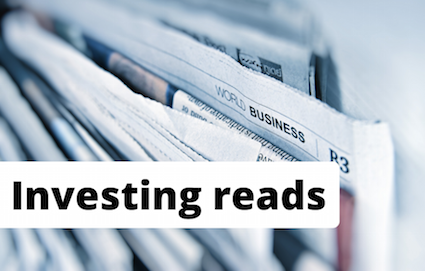James de Uphaugh: What to expect in 2023

The sharp move up in the cost of risk hit returns from most markets and the classic “plug and play” 60/40 equity bond portfolio had its worst year since the 1930s.
And yet the UK equity market was resilient to these strong cross currents.
It also had to absorb a degree of political uncertainty normally associated with the likes of Italy.
Big chunks of the UK equity market that had been written off as ‘yesteryear’ became sought after: international energy companies – it turns out it matters where your energy comes from; mining – a lot of copper is going to be needed for the energy transition; deposit rich banks – analysts raced to upgrade profit expectations as deposits made money for the first time since the global financial crisis and dividends began to surprise on the upside.
IMF: 2023 will be tougher than 2022 for the world’s economies
Defence companies became prized for their long duration order books as it became clear that money spent on deterrence was good value for democracies.
All good for the UK equity market.
How will the UK equity markets fare in 2023 as we exit 2022 with “permacrisis” as the Collins word of the year?
Three points are worth noting: firstly valuation trumps sentiment over the long term, secondly, shares are rarely a bargain when all the news is rosy and thirdly, the consensus tends to over focus on the short term.
In that vein if I was to do a simple Twitter summary of the tomes from strategists in my inbox it would be “mind your eye on markets in the first half but get ready for a better second half”. Markets rarely toe the line of consensus though.
Particularly when the economic news is getting less bad and there are not huge imbalances in the real economy that could amplify the undoubted near term real economic headwinds the UK and many other economies face.
Pigs and swans
The US Fed is determined to move inflation down to manageable levels.
Earlier in 2022, it looked possible such action could risk a bad outcome for the US and therefore the world via the dollar.
Already, however, we are seeing better news on inflation and so that risk of a really bad outcome is greatly reduced.
UK and Europe face more of a ‘pig in the python’ on energy when it comes to inflation but here also the picture is past the worst, so the chance of bad outcomes seems dramatically reduced as we enter 2023.
Here again, there are strong positives that are emerging in the corporate landscape: multiple ‘black swans’ (Brexit, Covid, the supply chain crisis, Ukraine) have engendered a corporate fatigue in many SMEs and the gusher of cash from venture capital ready to unpick profitable incumbent verticals has been turned off.
The result is the value of incumbency has increased dramatically so, for example, Tesco does not need to worry about ‘q-commerce’ in quite the same way it did a year ago.
Indeed the corporate life cycle has become Darwinism on steroids and the UK equity is rammed with examples that are taking advantage of this tough near term environment to gain share responsibly at high incremental returns: Centrica, Dunelm, Greggs, Whitbread, Howden, Ashtead to name but a few.
Importantly we are looking for companies growing responsibly in a way that works for all stakeholders.
Greggs was a pioneer of this with their Breakfast Clubs for school kids. When they started it at the turn of the century it might have been called doing the right thing, now it is termed ESG.
‘Very disappointing’ year for Majedie as share price falls 24.9%
The black swans of the last few years have also shown the importance of supply chain resilience.
Corporates now rightly obsess over their single points of failure. In this vein corporates are looking to reduce their dependence on China (witness Apple’s move to switch some production to India) and also hold more stock in case things don’t go to plan.
This gentle deglobalisation is a strong long term positive current for the likes of RS and Intel.
The UK equity market has had a subdued period since the Brexit vote in 2016, UK equity flows have been persistently negative since and yet 2022 saw a stabilisation as the quality and low valuation came to the fore.
Markets are anticipatory and if we are right that the economic news becomes less bad then we are in the foothills of a renaissance of UK equities.
James de Uphaugh is head of the Liontrust Global Fundamental team and fund manager of Edinburgh Investment trust
World News || Latest News || U.S. News
Source link


